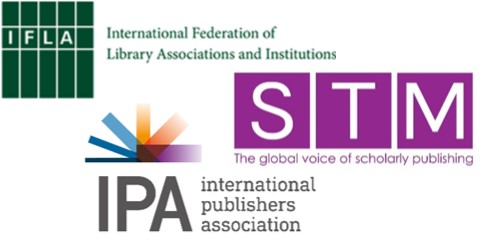The 35th meeting of the international organisations representing publishers and libraries in London on 9th March saw agreement on a number of these priorities. Participants came from the International Federation of Library Associations and Institutions (IFLA), the International Publishers Association (IPA) and the International Association of Scientific, Technical and Medical Publishers (STM).
The participants underlined their common interest in advancing discussions at the World Intellectual Property Organisation’s (WIPO) Standing Committee on Copyright and Related Rights. In a joint letter to WIPO’s Director General, they are urging that organisation to take steps to ensure meaningful discussion on proposed action plans on exceptions and limitations for libraries, archives and museums at the Committee’s next meeting.
Following years of discussion on this topic at the global level, it is time for practical progress which will make it easier for libraries and publishers to work together on the regional, national and local levels. This will contribute to maximising access to information around the world in a sustainable fashion.
The representatives of the libraries and publishers also stressed the challenge posed by deliberately deceptive scholarly journals, which cost researchers both money and reputation. We agreed to work further to identify and promote tools, such as Think, Check, Submit, which help researchers and librarians take a proactive stance in identifying and avoiding such publications.
They agreed that written works must be recognised as an essential pillar of heritage. In designing cultural policies and programmes, governments should ensure that the written word is properly preserved and supported. In line with the UNESCO Recommendation on documentary heritage of 2015, there need to be meaningful preservation policies for the digital age – the good practices already adopted by many publishers should be shared more widely.
Finally, they reiterated the message in the joint IFLA-IPA statement of 28 September 2016 that there should be no trade-off between quality and quantity of information. While the growing amount of information that is produced and access is to be celebrated, there is an enduring need for excellence.
IFLA, IPA and STM confirmed a further meeting to take forward these discussions would be held in September 2018.
Press contacts:
IFLA: Stephen Wyber, Stephen.wyber@ifla.org, +31 70 3140884
IPA: James Taylor, taylor@internationalpublishers.org, +41 79 821 22 30
STM : Matt McKay, mckay@stm-assoc.org, +44 7769 646931
About IFLA
The International Federation of Library Associations and Institutions (IFLA) is the leading international body representing the interests of library and information services and their users. It is the global voice of the library and information profession, with over 1400 members in nearly 150 countries. It places the importance of universal and equitable access to information as a means of promoting social, educational, cultural, democratic and economic wellbeing at heart of its values, and has a mission to promote high standards of provision and delivery of library and information services globally. @IFLA
About IPA
The International Publishers Association (IPA) is the world’s largest federation of publishers’ associations. Established in 1896, the IPA is an industry body with a human rights mandate. The IPA’s mission is to promote and protect publishing and to raise awareness of publishing as a force for economic, cultural and social development. Working in cooperation with the World Intellectual Property Organization (WIPO) and numerous international NGOs, the IPA champions the interests of book and journal publishing at national and supranational level. Internationally, the IPA actively opposes censorship and promotes copyright, freedom to publish (including through the IPA Prix Voltaire), and literacy. @IntPublishers
About STM
STM is the leading global trade association for academic and professional publishers. It has 145 members in 21 countries who each year collectively publish nearly 66% of all journal articles and tens of thousands of monographs and reference works. STM members include learned societies, university presses, both subscription and open access publishers, new starts and established players. @STMAssoc

